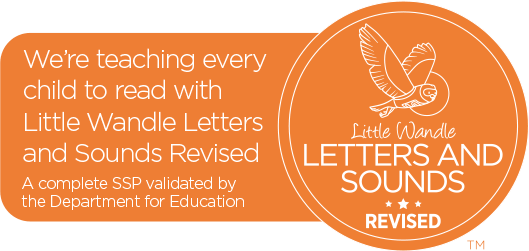Our Curriculum
Curriculum Statement
Intent
At Burman Infant School, we are committed to providing children with a broad and balanced yet varied curriculum. We strive to support all learners to achieve their full potential. This is our aim from Nursery to Year 2 regardless of needs, backgrounds or abilities. We are driven by the need to prepare our children for a lifetime of learning. It is our mission to target areas of interest, harness inquisitive minds and promote an awareness of the wider world.
Implementation
The implementation of learning at Burman is centred around the Solihull Curriculum and Development Matters (FKS), the National Curriculum (KS1) and the importance of Reading. Variety and teacher skill is woven throughout all subjects. Lessons are driven by attainment targets alongside subject content. Each area of learning has a subject intent and whole school policy which outlines learning delivery and opportunities. Every year group enriches the learning experience of all children by creating an environment which encourages and supports them to succeed.
Impact
The desired outcomes of the curriculum at Burman ensure that pupils are well rounded learners with rich experience of all subjects, ready to embark on their Key Stage Two education. Children are well equipped with the foundations and skills to achieve success in all areas of learning. They can speak of their learning showing enjoyment of their educational experiences. Children have an understanding of what they are good at and have developed skills to face challenges.
At Burman we believe that one of our most important tasks is to equip children with the skills to be good communicators. We aim to do this through teaching them to speak, listen, read and write with skill and independence. Language is incorporated into all areas of the curriculum and is a key aspect of all children’s learning and development.
Speaking and listening
Language is a vital part of learning and spoken language in particular has a key role in children’s learning. We provide many varied opportunities within our teaching and learning to encourage children’s language development, such as through drama and role play, problem solving activities, class discussions and visits. Within school our children use speaking and listening to share ideas, speculate, make decisions, solve problems, enjoy listening to music or poetry and to reflect upon different ideas. At Burman we value the importance of children being able to develop good social relationships and this depends on them being able to speak and listen effectively. It is very important that children at an early stage learn to express themselves and can communicate their ideas, feelings and knowledge with increasing confidence.
At Burman we use Little Wandle Letters and Sounds Revised – a systematic synthetic approach to Phonics, which provides a solid foundation in Reading for all.
Curriculum-Subjects (ID 1090)
-
Phonics and Spelling
Phonics and Spelling
Phonics and Spelling
At Burman Infant School, our Phonics curriculum intent is that all children develop into confident, independent, lifelong readers, equipped with the knowledge and skills to independently decode texts for learning and pleasure.
The Phonics curriculum from Nursery to Year 2 is implemented through Little Wandle Letters and Sounds Revised – a systematic synthetic approach, which provides a solid foundation in Reading for all children.
The programme provides a full progression through all commonly occurring Grapheme-Phoneme-Correspondences (GPCs), working from simple to more complex, and taking into account the frequency of their occurrence in the most commonly encountered words. All the graphemes taught are practised in words, sentences and fully decodable books. Children review and revise GPCs and words daily, weekly and across terms and years in order to move this knowledge into their long-term memory.
The Phonics programme enables teaching staff to embed the following features, as identified by The English Hubs Programme:
Seven features of effective phonics practice:
- direct teaching in frequent, short bursts
- consistency of approach
- secure, systematic progression in phonics learning
- maintaining pace of learning
- providing repeated practice
- application of phonics using matched decodable books
- early identification of children at risk of falling behind, linked to the provision of effective keep-up support.
The programme includes application using decodable books as an essential stage of the teaching sequence. We use Collins Big Cat for Little Wandle Letters and Sounds Revised fully decodable books that are matched to our programme progression.
Children need to learn to read as quickly as possible, so that they can move from learning to read, to reading to learn giving them access to the treasure trove of reading. Our expectations are aspirational but achievable. Children are assessed in their Phonics learning at the end of each half term, and those requiring additional practice receive Daily Keep Up in order to revisit and embed their learning and to enable them to keep up with their peers.
Programme Progression
Once children reviewed and secured Phonics skills up to Phase 5 of the programme, they move to Spelling lessons in Year 2.
At Burman Infant School, our Phonics curriculum intent is that all children develop into confident, independent, lifelong readers, equipped with the knowledge and skills to independently decode texts for learning and pleasure.
The Phonics curriculum from Nursery to Year 2 is implemented through Little Wandle Letters and Sounds Revised – a systematic synthetic approach, which provides a solid foundation in Reading for all children.
The programme provides a full progression through all commonly occurring Grapheme-Phoneme-Correspondences (GPCs), working from simple to more complex, and taking into account the frequency of their occurrence in the most commonly encountered words. All the graphemes taught are practised in words, sentences and fully decodable books. Children review and revise GPCs and words daily, weekly and across terms and years in order to move this knowledge into their long-term memory.
The Phonics programme enables teaching staff to embed the following features, as identified by The English Hubs Programme:
Seven features of effective phonics practice:
- direct teaching in frequent, short bursts
- consistency of approach
- secure, systematic progression in phonics learning
- maintaining pace of learning
- providing repeated practice
- application of phonics using matched decodable books
- early identification of children at risk of falling behind, linked to the provision of effective keep-up support.
The programme includes application using decodable books as an essential stage of the teaching sequence. We use Collins Big Cat for Little Wandle Letters and Sounds Revised fully decodable books that are matched to our programme progression.
Children need to learn to read as quickly as possible, so that they can move from learning to read, to reading to learn giving them access to the treasure trove of reading. Our expectations are aspirational but achievable. Children are assessed in their Phonics learning at the end of each half term, and those requiring additional practice receive Daily Keep Up in order to revisit and embed their learning and to enable them to keep up with their peers.
Programme Progression
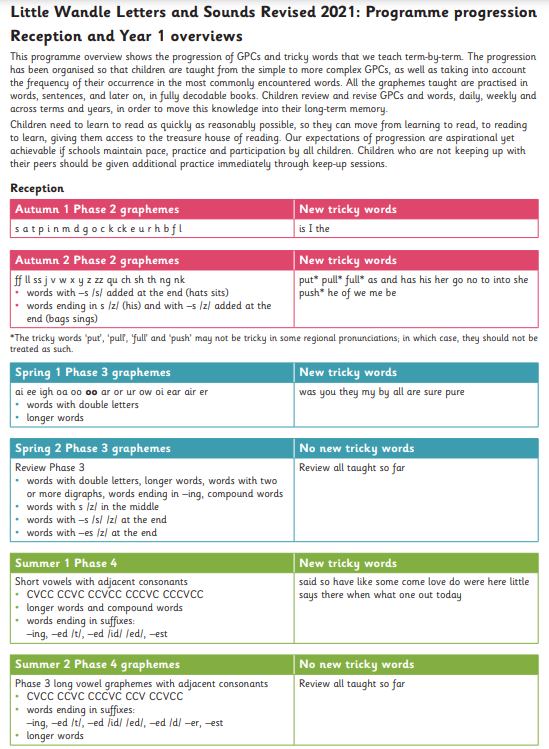
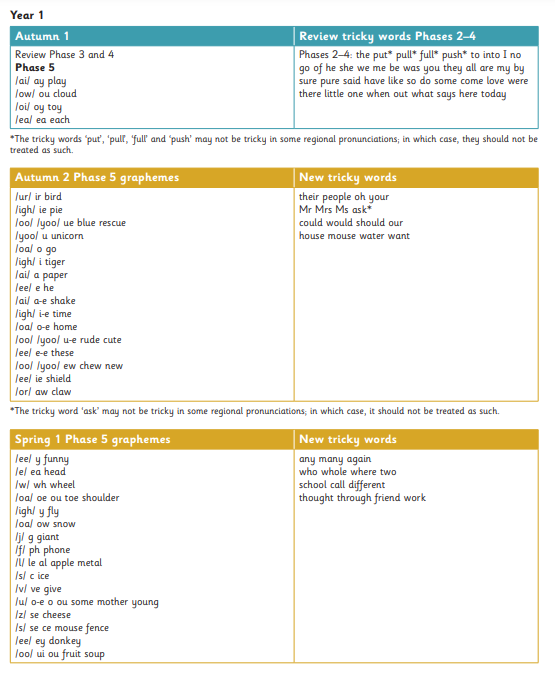
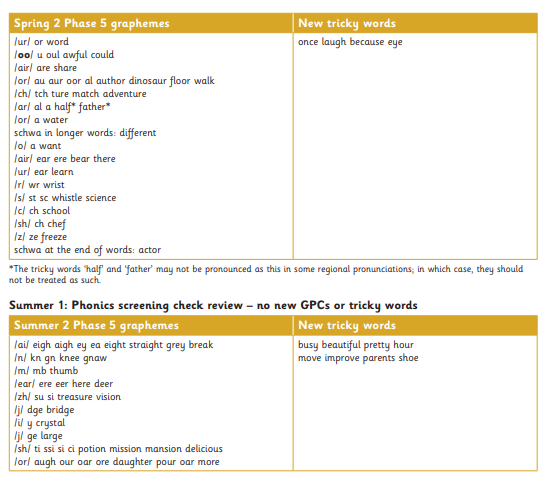
Once children reviewed and secured Phonics skills up to Phase 5 of the programme, they move to Spelling lessons in Year 2. 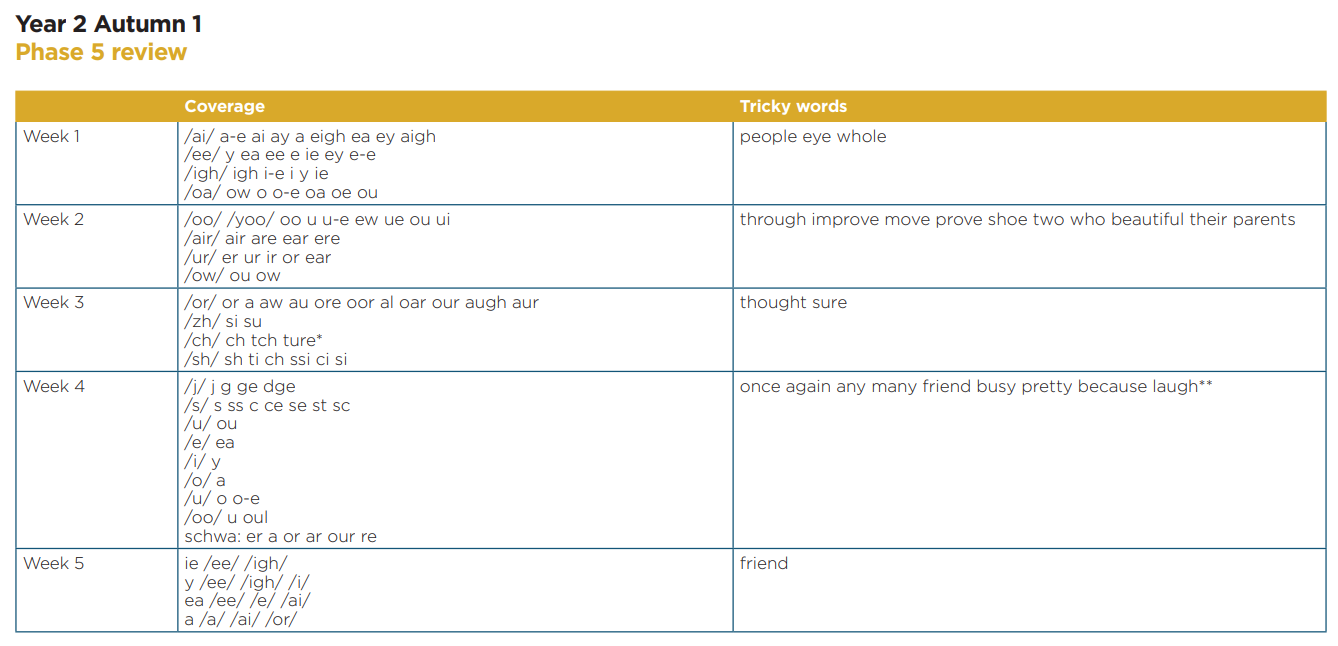
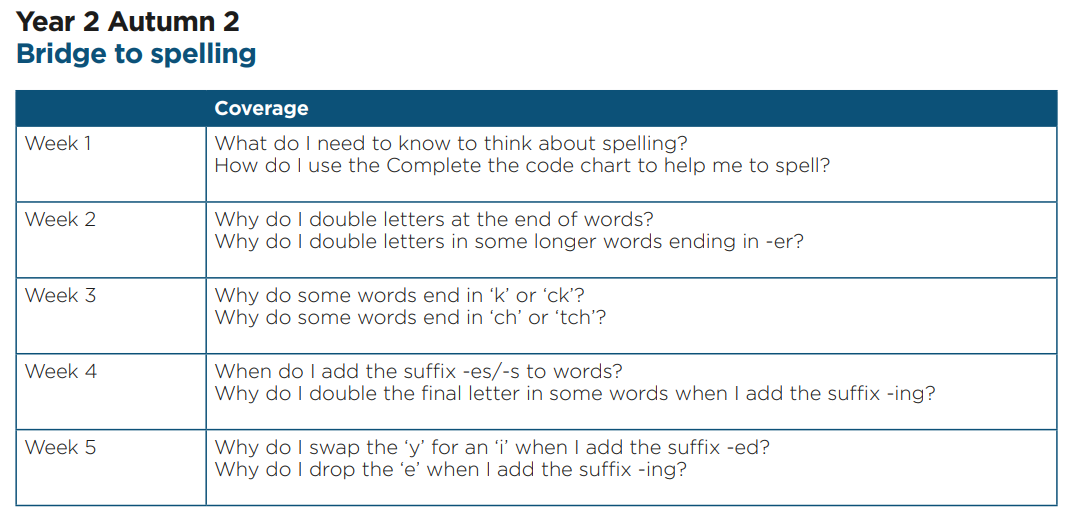
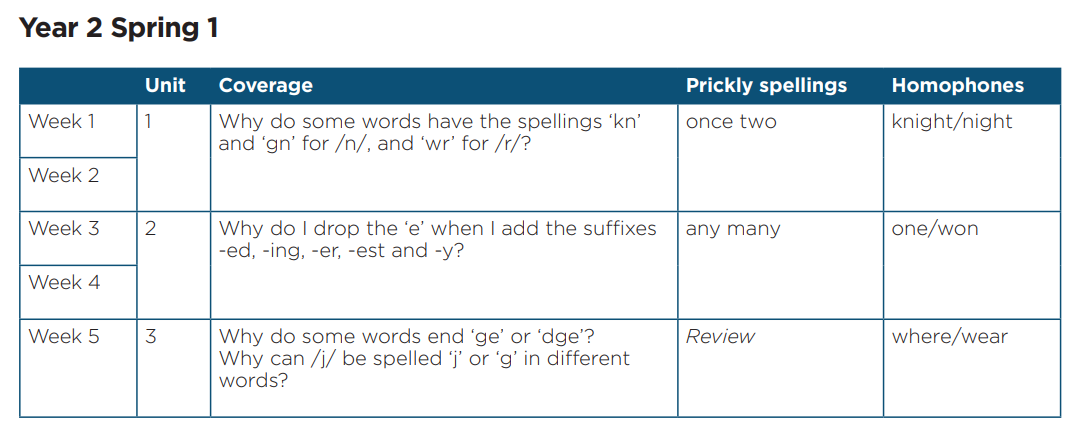
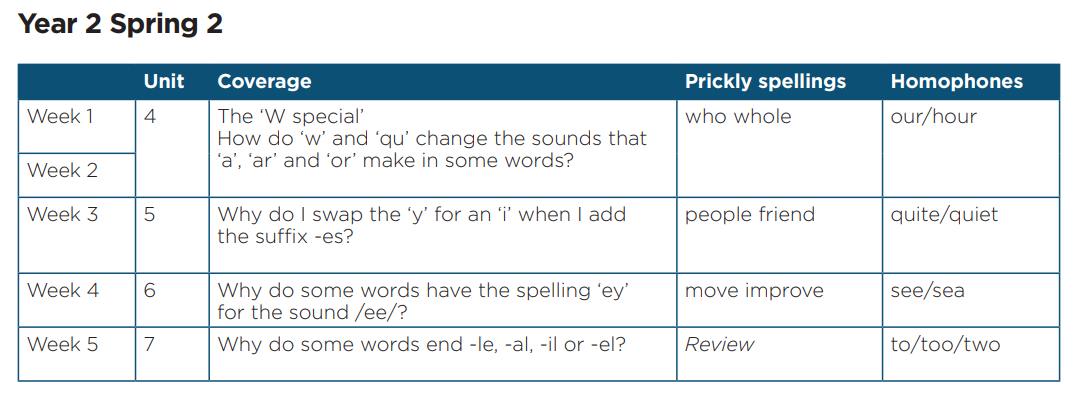
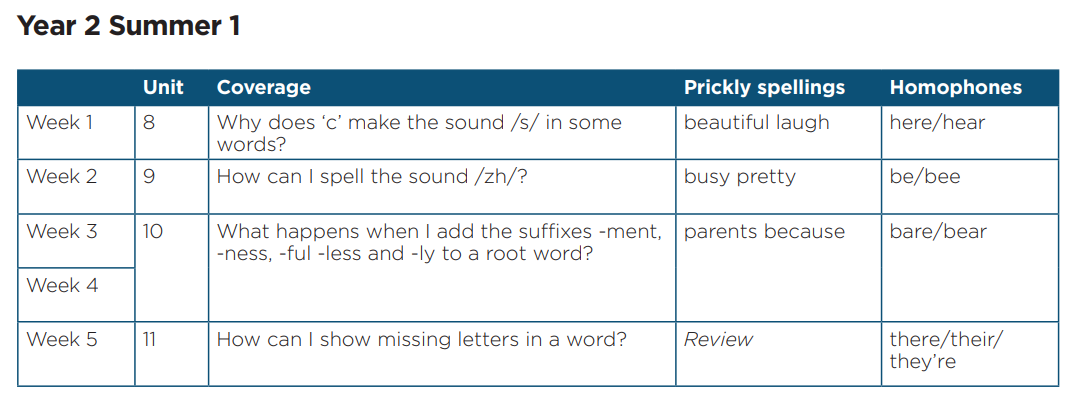

Reading
The skill and enjoyment of reading benefits children greatly throughout their lives. It is therefore important that children acquire the basic skills that will enable them to become confident and fluent readers that engage with enjoyment.
Reading is an integral part of all learning that takes place at Burman every day. Children are involved in reading for many different purposes such as; following written instructions, gathering information and for interest and enjoyment, whilst developing and extending their vocabulary, skills and confidence. They are exposed to a wide range of texts from different cultures and genres including fiction, non-fiction and poetry. Our arrangement of reading books complies with the National Reading Book Band levels. The structure is based on careful research into the kinds of words used in each book, linking directly with phonetical knowledge and understanding. Each ‘band’ is represented by a colour and supports the development of progressive reading strategies and subsequently promotes reading for enjoyment.
Writing
Throughout our curriculum at Burman we provide opportunities and experiences that will interest and stimulate children and give them different purposes for which they need to write. We value children’s early attempts at writing and work to develop their ability to express themselves through the written word. It is important that children learn to write in different ways such as; in recording factual information, writing letters or invitations and writing stories for pleasure. We aim to gradually develop children’s ability to spell a variety of words and teach them how to use dictionaries to enable them to look up more difficult words.
Handwriting skills are taught from an early stage and children are encouraged to write letters based on a cursive script, enabling them to join letters naturally as they progress further throughout the school. Children are encouraged to ensure their writing is legible and to take pride in the presentation of their written work.
Mathematics
At Burman Infant School, the aim is to ensure that children become fluent in the fundamentals of Mathematics, are able to reason mathematically and can solve problems by applying their Mathematical knowledge.
Children’s knowledge of Number, Measure and Geometry are embedded over time through the use of a spiral curriculum. There is a focus first on ensuring children are secure in the mental and written calculation strategies appropriate to their age, before then providing children with opportunities to gain a deeper understanding of Maths through reasoning and problem solving.
In Nursery and Reception, the learning environment also provides children with the opportunities to begin problem solving through both adult led questioning and independent investigation. In Year 1 and Year 2 Mathematical topics are taught in blocks, to give children the opportunity to demonstrate and build upon prior knowledge and enable the achievement of ‘mastery’ over time.
A ‘Concrete, Pictorial, Abstract’ approach is applied throughout school which develops a deep and sustainable understanding of mathematical concepts. Teachers and children will move fluidly between each approach to reinforce concepts. Children are encouraged to illustrate Maths problems in a variety of ways, for example, drawing an array or jottings representing dienes. Varying the apparatus and methods they use to solve a problem helps children to make quicker mental connections between the concrete, pictorial and abstract phases.
Nursery and Reception follow the Solihull Six Term plan to ensure all children are taught the required knowledge and skills by the end of Reception; with a key focus on Mathematical vocabulary. Children’s Maths is assessed through teacher assessment against Development Matters and Early Learning Goals. Maths has an adult led focus once a week, with independent Maths activities available throughout the week to enable children to consolidate their learning. Practical Maths Activity sheets are sent home throughout the year to support parents in consolidating children’s learning.
In Year 1 and Year 2, we use a range of planning resources and guidance including those provided by Power Maths, the White Rose Hubs and NCETM. The School Jam app is used to consolidate learning at home through practical activities, games and instructional videos. Through our teaching we continuously monitor pupils’ progress against expected attainment for their age, making formative assessment notes on planning that is used to inform future lessons. Where needed children are given extra support through immediate intervention or a more structured Maths intervention programs.
Throughout school, all adults reinforce an expectation that all children are capable of achieving high standards in Mathematics and that making mistakes plays a key role in our learning.
Science
Young children are natural scientists. They ask questions and are eager to find out about the world in which they were growing up. At Burman, we want children to be engaged from a young age, enjoying finding out how and why things work in the natural world. Science vocabulary can empower children to explain their thinking succinctly and accurately.
In a technological world, it is vital to inspire children to a possible future in Science. We want to learn about and share all the good that science and scientists have provided over many years.
We need children to build up a bank of useful and accurate vocabulary which will equip them beyond the Key Stage so they are confident reporters on the world around them.
We want children to reflect on the fragility of the Earth and its resources so as they mature, they can make informed decisions about the Earth and its future.
How do we do this?
FKS
Children observe the world around them and talk about changes they see, such as animals and plant growing and changing, focusing on key vocabulary to describe these changes.
Year 1
Children follow a weekly plan of Science lessons focusing on building up interest and excitement in investigative Science, broadly based on ‘Engaging Science’ (Solihull’s own Science curriculum).
Their school visit is to Brandon Marsh, focusing on natural habitats.
Year 2
Children follow a weekly plan of science lessons, broadly based on broadly based on ‘Engaging Science’ (Solihull’s own Science curriculum), which is used to support the school’s own medium term plan for Science. In each unit there are investigations and skills linked to the topic being studied, ensuring that children can meet the expectations for the end of the Key Stage.
Teachers use evaluations of lessons to monitor the development of children’s knowledge and skills and within a framework to plan the next lessons.
Please refer to our curriculum overviews to learn the content of our science topics.
Design technology
Children love to build and create and it is a fantastic way to generate confidence, resilience and self-esteem.
In designing, we want children to think logically and clearly with a growing understanding of the properties if materials in their product.
We want them to plan carefully and design products that are appealing and fit for the purpose for which they are made.
In making, we want our children to select and use a wide range of materials and tools, learning to use them sensibly and to assess their own risk when using them.
We want them to construct carefully and to persevere to overcome problems. We take part in lots of designing and making projects, from’ pop up’ cards to ‘alien’ puppets which link closely to our termly topics and allow the children to explore, design and make building on previous knowledge and skills.
computing
At Burman we aim to develop each child’s ICT capabilities to support and enhance their learning across other areas of the curriculum. Computing has become part of the way we all work and integral to our daily lives and to the future of our children. We have a computer suite which is used by the children from Reception to Year 2.
In Foundation Key Stage children have the opportunity to use digital props within the role-play e.g. talking telephones, shop tills and computers. The children are introduced to a range of technology within the classroom setting: remote control toys, talking butterflies and Beebots. The children explore the class computer and there are planned activities in order to develop their skills throughout Nursery and Reception. The interactive whiteboard and the class iPad provide children with a range of activities to explore.
In Year 1 the children are provided with their own log on cards and taught how to log onto the computer. Children are taught the importance of keeping personal information private and therefore understand why they have their own usernames and password to log on.
The children are taught control and monitoring, through the program ‘Terry the Turtle’. The children are given an introduction to animation using the software Scratch, using basic skills. The children use ‘The Hungry Caterpillar’ in order to word process and adding images to text using copying and paste.
In Year 2 the children continue to develop their animation skills using the software Scratch. The children are taught to use their transferable skills across both Pivot and Scratch in order to use technology purposefully to create, organise, store, manipulate and retrieve digital content.
Internet Safety
At Burman we take our duty to prepare our children, and their families, with the knowledge to use the internet, and other devices safely and therefore that remains an integral part of our planning. We discuss with the children the technology used both at home and at school. Activities are sent home for parents to fill out with the children about the use of technology.
Online safety is taught half termly in in online safety sessions computing lessons. It is also embedded across the curriculum to enable children to become safe users of the internet. The acronym ‘SMART’ is displayed throughout the school to ensure the children are aware of how they can build on their skills in order to be SMART users now and in the future.
‘Safer Internet Day’ is covered throughout the whole school, informing the children where to go for help and support when they have concerns. Each year we follow a new theme, for example our theme for our 2020 was ‘Free to be me. Exploring Online Identity.’ We also send home ‘Our Parents and Carer Guide’ for Keeping Safe Online; alongside supportive resources from ‘Think U Know’.
By the end of their time at Burman the children will be able to use technology safely and purposefully to create, organise, store, manipulate and retrieve digital content.
Geography and History
Geography and History at Burman enables the children to investigate their local community, country and other parts of the world. We undertake local walks and educational visits enabling the children to have ‘hands on’ experiences.
Children also access information about a topic through the use of ICT. Geography and History provides many cross curricular opportunities and is a very important part of our curriculum.
Educational visits are organised for each year group to enhance and support the school curriculum. Parents are given plenty of notice and are asked to make a voluntary contribution towards the visit.
Music
Music and singing is an integral part of life at Burman School and can offer opportunities which are less accessible in other areas.
Our aim is to imbue children with a love of music through exploration of their voices and instruments; composing and performing.
It is our aim at Burman to give our children a range of musical opportunities and a grounding in the early basics of musical knowledge and skills. These will include, singing, listening, appraising, composing and performing. Through this, our children will begin to develop an understanding of the place of music in their own and the wider community as well as important occasions in their own lives. We want to make music a joyful and rewarding experience and it is our hope that children’s enjoyment of music remains with them for life.
Music lessons at Burman engage and inspire children to develop a love of music and increase their self-confidence, creativity and sense of achievement. The curriculum draws on a range of resources and lessons are practical. The children are taught to use their voices expressively and creatively by singing songs, speaking chants and rhymes. They begin to play tuned and untuned instruments with appropriate control, including the opportunity to learn the recorder in Y2. Children explore the elements of music and start to listen with concentration and understanding to a range of high-quality music. They have the opportunity to compose by experimenting with and combining instrumental sounds.
Music has a high profile in our School and we are supported effectively in our aims by Solihull Music.
Participation in Music develops a sense of wellbeing, belonging, community and team work. It also promotes listening and develops concentration.
We know our children have progressed in music when:
- They begin to sing in tune
- They can perform in front of their peers
- They can use classroom instruments for their intended purpose.
- They can compose simple music
- They begin to describe music using simple musical language.
PE
At Burman we we believe that a high quality PE curriculum should be an integral part of the whole school curriculum. Our PE curriculum aims to ensure that all children develop the Fundamental Movement Skills of PE, becoming more and more competent and confident across a broad range of opportunities to extend their agility, balance and coordination. Children develop their ability to apply these skills, with opportunities to compete and achieve Personal Bests, as well as make positive memories of physical movement in order to encourage them to lead active, healthy lives.
The curriculum is sequential and each Fundamental Movement Skill is deepened and developed within each Year Group. The curriculum also offers continuity with our link Junior School.
The 12 Fundamental movement skills that children develop during their physical education at Burman include:
| Balance | Coordination | Agility |
| Static balance:
1. 1 leg 2. Seated 3. Floorwork 4. Stance |
9. Ball skills | 11. Ball chasing |
| Dynamic Balance:
5. On a line 6. Jumping & landing |
10. Footwork | 12. Reaction & response |
| Counter Balance:
7. In pairs 8. Sending & receiving |
We recognise PE is a foundation for building character, developing resilience, determination and self-belief, as well as instilling values such as friendship and fair play. Alongside the development of the Fundamental Movement Skills we also intend for all children to develop their physical literacy through the development of Learning Behaviours. These include:
- Personal
- Social
- Applying physical
- Cognitive
- Creative
- Health & Fitness
Creative Art
In a rapidly changing world, it is vital to anchor children in their wide reaching culture and to develop their passions for subjects such as Art.
We want to children enjoy art and view themselves as ‘artists’.
We want them to be able to use a wide range of skills and techniques so that they can express themselves creatively and imaginatively.
We need children to build up a bank of descriptive vocabulary which will equip them beyond the Key Stage so they are confident when discussing art.
We want children to appreciate art work produced by themselves, others in school and great artists, and to be able to use a range of vocabulary to describe their preferences.
We hope that as children move on to Year Three and continue their education and learning that their love and skill base for creating art continues, allowing them to develop a life-long love of the subject, being able to appreciate high quality art work and to be able to contemplate a career within the art world.
Religious education
In Religious Education the children have opportunities to learn about and share knowledge of their own faith and to experience elements of the faiths of others. We also encourage the children to learn from their knowledge and relate it to their own personal experience, as they develop spiritual, moral, social and cultural awareness.
At Burman we use an enquiry-based approach to RE. We use the Discovery RE scheme which encourages children to be reflective of their own and others experiences and religions. We explore a range of world-wide religions.
Each half-term begins with a key question to engage our young children. Together, we then investigate the theme whilst evaluating and encouraging personal expression. We believe this will enable our young learners to continue their knowledge in this subject as they move onto Key Stage 2 and beyond.
PSHE & RSHE
At Burman we believe it is our responsibility to support all children to understand and navigate a rapidly changing world by providing them with the knowledge, understanding, attitudes, values and skills they need in order to reach their potential as individuals and within their community.
We adopt a whole school approach to the teaching of PSHE, whereby all year groups work on the same learning theme at the same time, and these themes are linked to and celebrated in our whole school assemblies.
Relationships are at the heart of the PSHE curriculum, both relationship with ourselves and others. This helps children develop empathy and social skills so that all children are given the knowledge and skills that they can apply to their lives within and beyond school. This is explored explicitly in the ‘Relationships’ theme.
In the ‘Being Me in my world’ and ‘Dreams and Goals’ themes, children focus on their attitudes towards learning, motivation and resilience. The ‘Celebrating Difference’ theme explores differences between themselves and others, prejudice, discrimination, acceptance and understanding. Anti-bullying is a core focus in this particular unit. Children also learn about personal safeguarding, safeguarding of others and how to access help and support.
Physical health is covered in the ‘Healthy Me’ theme. This includes understanding the importance of physical activity, diet, personal hygiene and where to access support. Safety education is also integral to this unit.
RSHE is included within the ‘Changing Me’ theme, where children explore the concepts of growth, change, respecting their body and growing up. More information about RSHE at Burman can be found by clicking the ‘RSHE Parent Information’ link under ‘Related Information’ below.
Positive mental health and wellbeing underpins all PSHE lessons. Every lesson includes a special ‘Calm me’ time, where children are taught mindfulness strategies in order to empower them to choose how to respond to the challenges of their world, rather than react. Developing resilience is also a key skill that runs throughout the PSHE curriculum.
This links to our whole-school BLP approach which promotes and celebrates the learning attributes of resilience, reciprocity, reflectiveness and resourcefulness through the use of four characters that are displayed in the library and every classroom.
Related information
Whole School
RSHE Parent Information (hosted on YouTube)
Reception
-
Reception - Autumn 24
download_for_offline
download_for_offlineReception - Autumn 24
- Reception - Spring 25 download_for_offline
download_for_offlineReception - Spring 25
- Reception - Summer 25 download_for_offline
download_for_offlineReception - Summer 25
Reception Spring Term Curriculum Overview (PDF)
Reception Autumn Term Curriculum Overview (PDF)
Reception Summer Term Curriculum Overview (PDF)
Reading Meeting Autumn 2022 (PDF)
Nursery
-
Nursery - Autumn 24
download_for_offline
download_for_offlineNursery - Autumn 24
- Nursery - Spring 25 download_for_offline
download_for_offlineNursery - Spring 25
- Nursery - Summer 25 download_for_offline
download_for_offlineNursery - Summer 25
Nursey Spring Curriculum Overview 2023 (PDF)
Nursery Autumn Term Curriculum Overview (PDF)
Nursery Summer Curriculum Overview 2022 (PDF)
Year 1 - Nursery - Spring 25 download_for_offline
- Reception - Spring 25 download_for_offline




